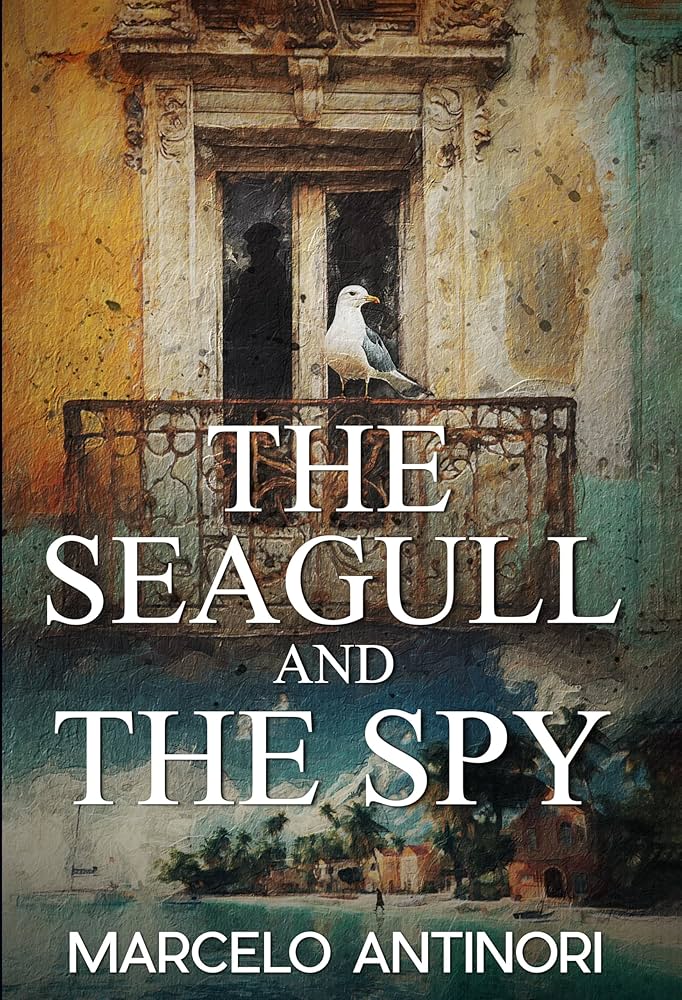Marcelo Antinori’s career path is anything but conventional. With a background in economics and decades of global experience in social and economic development, the Brazilian-born author has traded spreadsheets for storytelling, drawing on the places and people he’s encountered worldwide. His latest novel, The Seagull and the Spy, a sequel to The Condor’s Riddle, brings his characters into new adventures while preserving the spirit of the first novel.

Author Marcelo Antinori
Although Antinori currently resides in France, he maintains strong ties to Maryland’s Eastern Shore, where he also keeps a residence and works with local publisher Secant Publishing. This connection to Maryland is part of the larger fabric of his international life, which has profoundly shaped his writing. “Traveling through different countries and getting to know their cultures has broadened my understanding of people and places,” he says.
In The Condor’s Riddle, Antinori introduced readers to a cast of eccentrics, expatriates, and marginal figures struggling to survive amid international intrigue, drug cartels, and the looming presence of Chinese and American embassies. Central to the story was the mystery of El Dorado and the fabled city’s protection by generations of Indigenous people. The novel brought to life a magical world populated by a French archivist with a photographic memory, a Chinese exotic dancer, a remorseful German terrorist, and a blind Indigenous child with an extraordinary gift of perception.
Diverse these characters may be, but what is more surprising is what Antinori says about them, “Believe it or not, they all exist.” While the characters in his books are often exaggerated or fictionalized, they are inspired by real people he’s encountered in his travels. “I have a passion for those who don’t fit the mold, for people who are a little bit weird or live on the margins of society,” he says. “They’re the ones who end up doing the most interesting things.”
These characters intrigued Antinori so much that he wasn’t quite ready to let them go. “When you finish a book, sometimes the characters are still alive in your head. You want to keep playing with them, seeing what they’ll do next,” he said. This time, Antinori introduced a fresh plot involving an abandoned apartment with a mysterious past. “The idea came to me in a dream,” he says. “I had no idea what the story would be, but I started playing with the characters again. The thing is, when you know your characters well enough, you can put them in any situation—like a market or a confrontation—and just see what happens.”
The process of writing for Antinori is playful, even experimental. “Sometimes you develop a story, and it’s boring,” he says. “So I usually invent something completely absurd at this moment. Sometimes I create an accident, sometimes someone dies, and I have to reconstruct the story with this unexpected event.” To Antinori, that’s part of the fun.
Another aspect is the author’s ability to mix actual historical elements with fiction. In The Seagull and the Spy, a Hungarian character who once played violin for Hitler becomes entangled with Che Guevara’s German mistress, a story that pulls from real historical figures but stretches into the realm of imagination. “Only about 10% of what I write is not true,” Antinori says, quoting the Brazilian poet Manuel de Barros. “The rest, I invented.”
 Invented or not, Antinori’s fascination with diverse characters stems from his multicultural upbringing. Born in Brazil to an Italian family, he has worked extensively throughout Latin America, Africa, and Asia, “My characters are international,” he says, “because I feel I am international.”
Invented or not, Antinori’s fascination with diverse characters stems from his multicultural upbringing. Born in Brazil to an Italian family, he has worked extensively throughout Latin America, Africa, and Asia, “My characters are international,” he says, “because I feel I am international.”
But if you’re expecting a particular message or deep commentary, Antinori’s goal is more straightforward: he just wants to entertain. “I want to tell a good story,” he says. “I’m not interested in making profound statements. Everything that needed to be said has already been said. I’m here to entertain. I don’t like to be considered an artist. I’m an entertainer. He is acutely aware that his work stands apart from more serious literary pursuits, but he doesn’t mind. “I think readers today are looking for something to relax with,” he says. “And if my stories can offer that escape, then I’ve done my job.”
As for what’s next, Antinori is already at work on several new projects, including a novel set in Paris and another based on his travels in Japan. He also hopes to continue working with Salisbury-based publisher Ron Sauder from Secant Publishing, with whom he’s had great success. “Ron and I met many years ago, and he’s been fantastic. He takes the time to edit thoroughly, which is crucial for me since English isn’t my first language.”
Although he currently resides in France, Antinori maintains a solid connection to the Eastern Shore of Maryland, where he hopes to return regularly. “The quiet beauty of the Eastern Shore is inspiring in its own way,” he says, noting the contrast between Maryland’s peaceful landscapes and his novels’ vibrant, often chaotic settings.
He’s already planning a visit in January, including a possible book signing at the Easton Public Library. As he returns to the place that’s become one of his many homes, Marcelo Antinori’s journey as a novelist continues to unfold—one story at a time, one unexpected and playful twist after another.



Write a Letter to the Editor on this Article
We encourage readers to offer their point of view on this article by submitting the following form. Editing is sometimes necessary and is done at the discretion of the editorial staff.